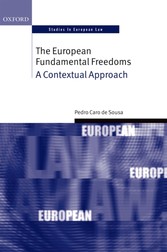Suchen und Finden
European Fundamental Freedoms: A Contextual Approach
Law can be looked at from both an internal legal perspective - reflected in the official discourse supporting legal decisions - and an external perspective - which is pursued by studies that look at the law from the outside as the subject of sociological, economic, or philosophical analysis. This external dimension - related to extra-legal factors that impact the law, such as the institutional environment in which the law is applied - is usually ignored, or notaddressed systematically by studies that focus on the internal perspective. By systematically internalizing these external elements into legal theory and practice, contextual approaches lead to the development of better descriptive theories and more attractive normative models of the law, andspecifically EU law, than de-contextualized approaches allow for. Additionally, contextual approaches are more self-aware than de-contextualized approaches, since they are able to make sense of the role that legal practice (by judges, legal practitioners, and academics) plays in the development of the law.It is through a contextual approach that Pedro Caro de Sousa develops a general theory of European constitutional law, in particular free movement law and the EU fundamental freedoms. As a contribution to the development of EU constitutionalism, this monograph focuses on the interplay between the different normative concerns behind the EUs market freedoms identified in traditional legal discourse and the various extra-legal and institutional factors that affect how that law is applied anddevelops in practice. Moving away from traditional studies of free movement law, Caro de Sousas book offers a fresh approach to free movement law. Rather than proposing normative approaches, he uses this approach to construct a broader thesis: that the EU law of free movement can best be understood asinterplay of traditional legal doctrines and practices and the specific institutional environment where this law is applied and developed.
Alle Preise verstehen sich inklusive der gesetzlichen MwSt.








